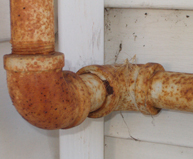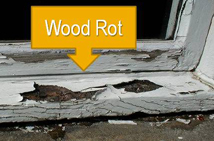 It goes without saying that if you notice water or dampness in your basement you have a problem somewhere that needs to be addressed.
It goes without saying that if you notice water or dampness in your basement you have a problem somewhere that needs to be addressed.
You can generally complete basement water leak repair yourself with the right tools and right information without having to hire a contractor.
The internet and YouTube are ripe with videos and instructions on how to address water intrusion in specific areas once you find a basement water leak.
Here I’ll detail for you the dangers associated with water intrusion anywhere and why it’s important to address the problem sooner rather than later.
It’s easy to put a damp basement or basement water leak repair on the “back burner” because too often many just don’t know where to start or who to call. The following topics covered here will help get you started.
- How to determine the source of your basement water leaks
- Why waterproofing in your basement is important
- What the health dangers are of too much moisture in your house
- Maintenance tips for minimizing your exposure to basement water problems
- Clues you may have too much household moisture even if you don’t see standing water
Basement Water Leak Repair Starts at the Source
Your water or dampness issues may be due to a water leak, moisture migration or it can be due to high humidity. There can be a number of sources, all of which can be visually determined by a walk through your home.
Putting together a simple checklist prior to your walk can eliminate potential causes and narrow down the list of suspects. Start with these locations… one or more of the following may be your cause. Many of these you’ll be able to see at its source meaning the water hasn’t traveled from some other location:
 Leaking toilet, shower or bathtub
Leaking toilet, shower or bathtub- Moisture migrating up through your concrete slab
- Moisture seeping through unsealed masonry block walls
- Gaps in windows or around doors
- Foundation leaks due to clogged, broken or the lack of perimeter drain piping
- Condensation on walls and floors during cold or humid months
- Cracks in fireplace chimneys
- Wet piping or pipe connections
- Leaking window wells
- Cracked or loose tiles
- Grading problems around your home’s perimeter
- Sanitary sewer or storm sewer backup
Why Water Leak Repair is Important
The 3 words you never want to have associated with your home are mold, mildew and biological growth. All can be the result of an unresolved basement water leak or moisture detection and an overlooked repair in other areas of your home.
Each in its own right presents health risks to you and your family. Left untreated, you and your family may be exposing yourself to one or more of the symptoms listed below.
- runny nose
 sneezing
sneezing- nasal congestion
- watery eyes
- skin rash
- itching
- asthma attacks
- wheezing
- chest tightness
- shortness of breath
Who is at risk? Individuals with asthma or allergies, pregnant women and infants, the elderly, individuals on medication, children 6-12 years old, and anyone with a weak immune system.
Not everyone will respond the same way to mold and mildew and those with allergies are already susceptible but why would you want to take a chance with any family member, relative or friend? Just because you may not experience any ill effects doesn’t mean that someone else living in your household or visiting guests or relatives will be as lucky as you.
Your Home’s Structure May Pay the Price
 While your health and that of your family are of paramount importance, second would surely be the investment you’ve made in your home. Besides mold and mildew, failing to make a basement water leak repair and doing it timely can also result in:
While your health and that of your family are of paramount importance, second would surely be the investment you’ve made in your home. Besides mold and mildew, failing to make a basement water leak repair and doing it timely can also result in:
- wood rot
- premature paint failure
- concrete spalling (chipping, flaking and scaling of concrete slabs)
- structural damage
Did you know current estimates show that replacement materials, needed to repair damage caused by wood rot alone, account for nearly 10 percent of the US annual wood production? This is not intended to be an environmental rant, however, how much of this can be avoided when steps are taken to identify and exact repairs on water leaks early?
Tips to Prevent Basement Water Leaks and House Humidity
Depending on where you live, dealing with moisture problems will differ from one climate type to another. Some areas are cold and wet while other areas are hot and dry. Running your air conditioner or furnace, the type of construction associated with your home and how it is or if it is weatherized will impact solutions for basement water leak repairs and drying a damp basement. In general, these tips will at least bring excessive humidity and moisture to the forefront so steps can be taken to minimize or eliminate future problems altogether.
- Fix leaks and seepage which is really the point of this post
- Mold can form in untreated leaks or spills within 24-48 hours so dry them ASAP
- Use an exhaust fan or open a window when taking a shower
- Leave interior doors open like closet doors for air circulation
- Keep air conditioning drip pans clean and condensate drain lines unplugged
- Keep indoor humidity below 60%. The highest rated humidity tester on Amazon.com only costs around $10.00.
- Use area rugs where possible since carpet over a concrete floor can absorb moisture
- Keep furniture away from wall corners to promote circulation
- If you have a crawlspace, put plastic over the dirt to prevent water intrusion. Ensure the crawl space is vented.
- Make sure drainage around your house slopes away from your home’s foundation
- Use dehumidifiers and air conditioners if you notice moisture on windows or other surfaces
It’s easy for us to ignore a dripping faucet or a rusty pipe connection but the down stream impacts of doing nothing can turn into something much more serious and expensive…both in terms of dollars and your health.
Try to incorporate a semi-annual or annual inspection of the likely culprits for future water leaks. Catching a pipe connection that has oxidized, replacing cracked or shrinking sealants or making water tight a dripping pipe before it becomes a major problem will save plenty in the long run.
Tagged with: basement water leak • basement water leak repair • basement water leaks • basement waterproofing • basement waterproofing manual • waterproofing in basement
Filed under: Defects





